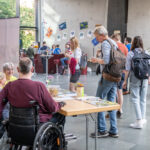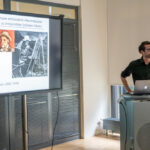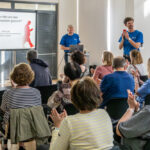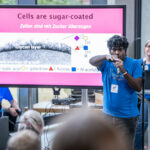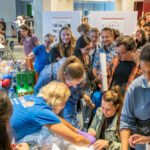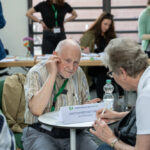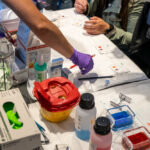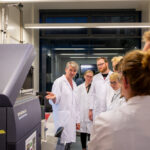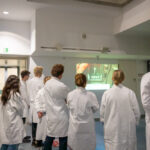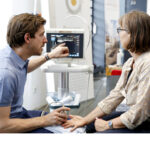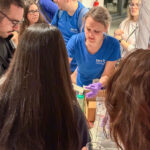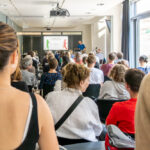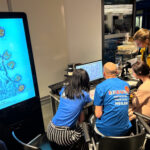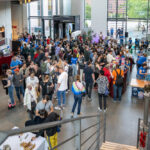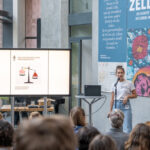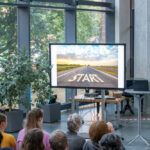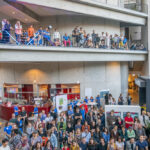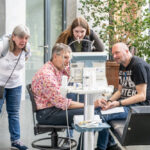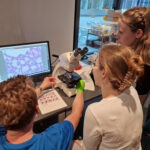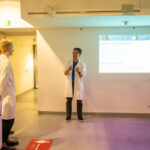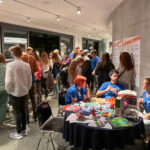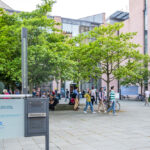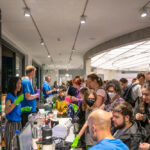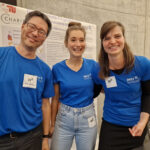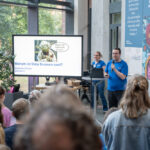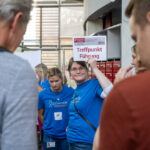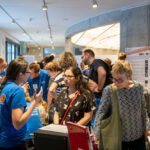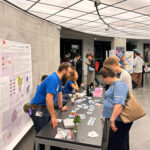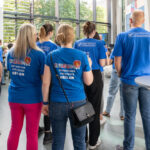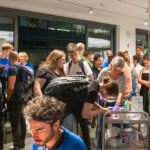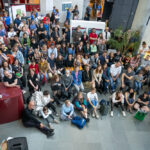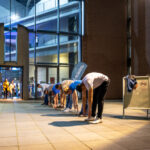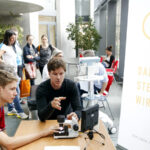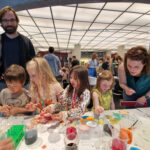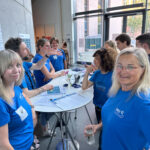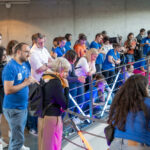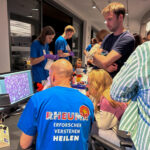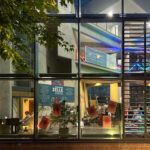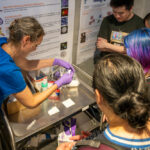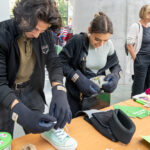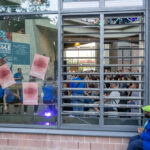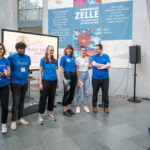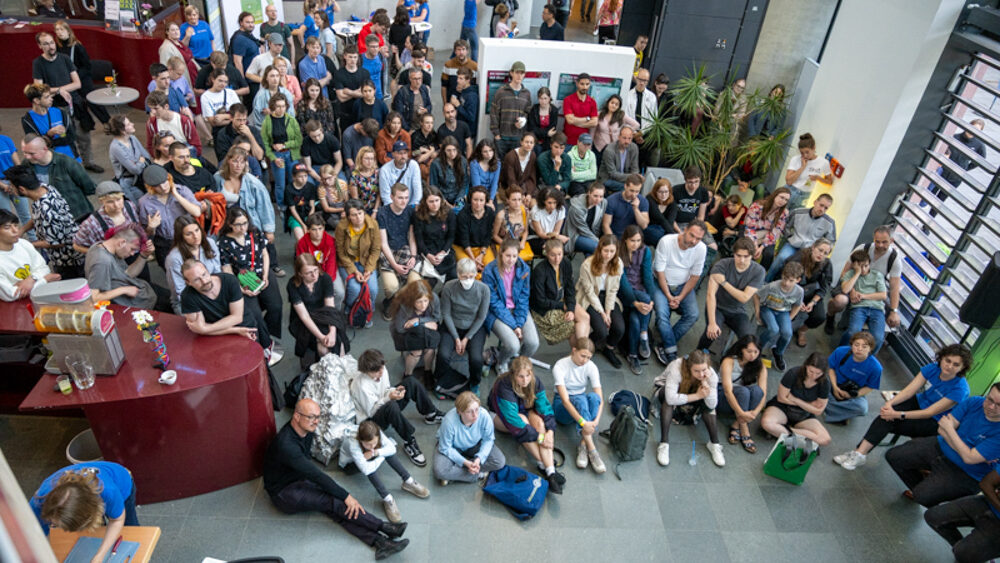

Night at the DRFZ – That was the Long Night of Science 2023
Retrospective
The 2023 Long Night of Science at the DRFZ was a triumphant success! 1800 visitors – more than ever before. It was clear from the get-go that Berliners were ready to soak up as much science as possible during the evening, with a queue of inquisitive visitors lining up outside the institute half an hour before the official kick-off of the event and the constant stream of guests did not stop until the doors were closed at midnight.
Luckily, we were well prepared to welcome our curious citizen scientists, having put together a varied and exciting programme in cooperation with the Max Planck Institute for Infection Biology and the Max Planck Unit for the Science of Pathogens. We were delighted to see that the lectures were full, the guided tours were fully booked, and despite the queue, people were happy to wait patiently to test their blood type. Questions and conversations flowed throughout the night, adding to the summery atmosphere – something that was clearly appreciated by the directors of all three institutes who stayed late into the night.
We would like to sincerely thank all the enthusiastic staff who helped to make all of this possible, including everyone who hosted the info-point, the guided tours, lectures and experimental stands throughout the evening and patiently answered all the curious questions of our guests. Special thanks goes to the representatives of the Rheuma-Liga Berlin e.V., the Deutsche Vereinigung Morbus Bechterew e.V. and the medical doctors from the Charité – Universitätsmedizin Berlin and the Immanuel Krankenhaus Berlin who were available for questions from patients and the interested public well into the night.
Bring on the next Long Night of Science on 22 June 2024!
This was our DRFZ programme
Our program corresponds to the research concept of the DRFZ: research in collaboration with clinics for the benefit of patients.
During the Long Night of Science, you can learn about our research methods and visions – from research of causes to cures – by performing your own experiments, enjoying the science slam and by joining a laboratory tour. Medical doctors will answer your questions about rheumatic diseases, and you can even undergo small health checks. Patient associations will also offer information and hourly participatory sports activities for those affected and interested.
For patients and interested individuals
Help for self-help – Patient organizations are available for questions: The Rheuma-Liga Berlin e.V. and the German Association for Ankylosing Spondylitis (Morbus Bechterew) e.V. provide information on self-help options for those affected, their family members, and interested individuals.
Mobile Inflammation Consultation
Clinical consultation on various rheumatic inflammatory conditions. Advice provided by specialist doctors from the Clinic of Rheumatology of the Charité and the Immanuel Hospital Berlin (Wannsee and Buch). Ask your questions in a relaxed atmosphere. An ultrasound device is available for a glimpse into your joints.
Capillaroscopy
Capillaroscopy examines the tiniest blood vessels in the skin, called capillaries, using special light microscopic techniques. This allows for the assessment of disease-related damage that can be caused by inflammatory processes or changes in the connective tissue within the vessels. Characteristic changes can be observed in some inflammatory rheumatic diseases affecting the blood vessels, skin, or connective tissue (known as vasculitis and collagenosis). What do your capillaries look like? The method is harmless and painless.
Do it yourself – experiments for all
Determine your blood group yourself and examine your own white blood cells under the microscope. Learn more about the functions of immune cells, which can both protect us and make us sick and about the immune system and its different cell types, including their interactions. Immerse yourself in the process of an immune reaction, how vaccinations work and the mechanisms behind allergic reactions. Playfully test your knowledge with an interactive quiz for young and old at the joint booth of the DRFZ and the German Society for Immunology.
What does the gut microbiota reveal about our health?
Approximately 70-80% of our immune system resides in the gut. A healthy gut microbiota contributes to maintaining a balanced immune system. The microorganisms in the gut interact with immune cells and aid in defending against pathogens. An imbalance in the gut microbiota can lead to inflammation and an increased risk of immune-mediated diseases such as allergies, asthma, and inflammatory bowel diseases. Under the microscope, you can observe the bacteria present in the gut and learn about how we study them.
How to distinguish disease-causing cells from healthy cells?
A commonly used method involves the use of antibodies that specifically bind to certain markers or proteins on the surface of cells. By labeling disease-causing or specific cells with a fluorescent dye or a magnetic tag, they can be differentiated from healthy cells and subsequently sorted using various techniques such as flow cytometry or magnetic separation. Is it confusing scientific jargon? Perhaps a little, but come and take a look over our shoulder at the DRFZ and see for yourself.
Program with fixed times
Guided tour through our laboratories
Starts hourly at 5:30 pm, 6:30 pm, 7:30 pm, 9:30 pm and 10:30 pm
We offer insights into the technologies and research methods at DRFZ, from the “FACS laboratory” to the “cell culture laboratory” and the “Ramin laboratory.” Follow the path that blood cells and tissue samples from patients usually take through our institute. Please note that the number of participants is limited. Please reserve your spot for the tour in advance at the information booth on-site.
Lectures in the seminar room – only in German
5:30 – 6:15 pm
How the immune system keeps us healthy?
Prof. Dr. Eicke Latz
(New) Scientific Director of the DRFZ, explains how the immune system protects us from disease.
6:30 – 7:15 pm
Therapeutic methods in rheumatology: What does the future hold for us?
Prof. Dr. Gerhard Krönke
(New) Head of the Clinic for Rheumatology and Clinical Immunology at Charité-Universitätsmedizin Berlin looks into the future of rheumatology and presents proven and new therapy methods.
Science Slam – Of Humans and Microbes
8:30-9:30 pm
Five young scientists, three institutes, one house trophy! You, the audience, get to decide who will win the coveted trophy for the best Science Slam at the end. The Max Planck Institute for Infection Biology, the Max Planck Research Unit for the Science of Pathogens, and the German Rheumatism Research Centre conduct research under one roof and are now competing against each other in the slam.
Special guest slam featuring Lisa Budzinski, the current German Science Slam champion.
In Search of Traces: Measuring the Cell
The cell, the fundamental unit of life, is too small to be observed by eye. However, through advanced physical and chemical methods, it has become possible to measure cells and create a molecular image of them. This progress is a prerequisite for successfully treating diseases that are currently considered incurable at the cellular level.
Our exhibition at the DRFZ sheds light on the fascinating research in the field of cell investigation. Using techniques such as microscopy, flow cytometry, and sequencing, cells are analyzed daily at the DRFZ. This allows us to examine the composition of cells, understand their functions, and explore changes in them at the molecular level. This deep understanding of cells and their interactions enables us to gain new insights into disease mechanisms and develop more advanced treatment options.
Step into our interactive website, where you can trace the journey from the initial discoveries to the present day and get to know the protagonists involved in the development of new cell research technologies.

 Deutsch
Deutsch